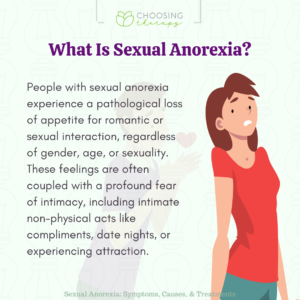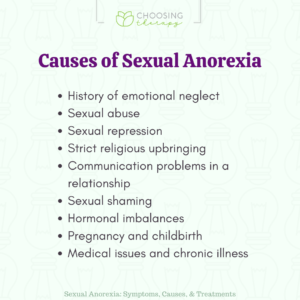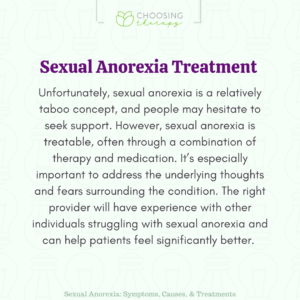Sexual anorexia refers to an intense dread, fear, or hatred of sexual intimacy. These emotions often cause people to obsess over or avoid situations in which sex may occur. Sexual anorexia often has a significant impact on the individual’s romantic relationships, and those who suffer from it usually experience increased instances of depression and anxiety.
What Is Sexual Anorexia?
People with sexual anorexia experience a pathological loss of appetite for romantic or sexual interaction, regardless of gender, age, or sexuality. These feelings are often coupled with a profound fear of intimacy, including intimate non-physical acts, like compliments, date nights, or experiencing attraction.
The term was coined by Dr. Patrick Carnes, who conceptualized sexual anorexia as a parellel to sex addiction.1 He believes both issues stem from having a preoccupation with sex, along with the intense need to be in control.
Sexual Healthcare For Women & Men Plushcare – Get personalized, high-quality healthcare online. In-network with most major insurers, with a typical out-of-pocket cost of just $30
Symptoms of Sexual Anorexia
Sexual anorexia is not an official diagnosis. However, its symptoms mirror many of the same symptoms as sexual aversion disorder (SAD). The overarching symptom of sexual anorexia is experiencing a sense of disgust and horror around sex.2 These feelings create an obsession, which can impact basic functioning, emotional regulation, and self-esteem.
Symptoms of sexual anorexia include:
- Lack of sexual desire
- Feeling afraid or angry when thinking about sex
- Negative preoccupation or obsession with sex
- Negative or judgmental attitudes about sex and body image
- Profound shame over past sexual experiences
- Engaging in self-destructive behavior to limit or stop sex
- Extreme efforts to avoid sexual contact
- Sacrificing hobbies, relationships, or other passions due to sexual aversion
- Feeling a sense of despair about sexual functioning or performance
- Distancing oneself from others
- Addictive sexual behavior (i.e., compulsive porn consumption, masturbation)
Causes of Sexual Anorexia
As with most conditions, there is no singular cause of sexual anorexia, but several factors may increase the likelihood of someone developing it. One study shows that 67% of people with sexual anorexia experienced sexual abuse, and 86% have a history of emotional abuse. Likewise, 40% cited having a sex addict in their immediate family.
Potential causes of sexual anorexia include the following:2
- History of emotional neglect
- Sexual abuse
- Sexual repression
- Strict religious upbringing
- Communication problems, such as lack of communication in a relationship
- Sexual shaming
- Hormonal imbalances
- Pregnancy and childbirth
- Medical issues and chronic illness
Effects of Sexual Anorexia
It’s no secret that we live in a society that places a great emphasis on sex, so it is understandable that sexual anorexia may contribute to poor self-esteem, difficulty socializing, and intensified anxiety. People may avoid dating and relationships as a result of their condition. In more serious cases, they might struggle with self-harm, substance use, or suicidal ideations.
Furthermore, sex has varying degrees of importance in relationships. Research shows that sex is generally associated with higher levels of happiness and satisfaction one’s partner.3 Additionally, frequent acts of physical affection (hugging, kissing, cuddling) also promote a sense of intimacy.4 Thus, sexual anorexia can pose significant challenges in relationships. Partners may grow frustrated, resentful, or confused with one another.
Top Rated Online Therapy Services
BetterHelp – Best Overall
“BetterHelp is an online therapy platform that quickly connects you with a licensed counselor or therapist and earned 4 out of 5 stars.” Visit BetterHelp
Talkspace – Sex & Intimacy Counseling for Couples
Get closer to your partner with private and convenient counseling, from the comfort of your home. Visit Talkspace
Sexual Anorexia Treatment
Unfortunately, sexual anorexia is a relatively taboo concept, and people may hesitate to seek support. However, sexual anorexia is treatable through a combination of therapy and medication. It’s especially important to address the underlying thoughts and fears surrounding the condition.The right provider will have experience with other individuals struggling with sexual anorexia and can help patients feel significantly better.
Therapy
Therapy can be a fantastic starting point for sexual anorexia recovery, as it can offer a non-judgmental and compassionate space for exploring people to explore their fears. When searching for a therapist, look for a provider who has experience treating sexual disorders and dysfunction. People often find a therapist through their personal network, insurance company, or an online directory.
Common types of therapy that may help with sexual anorexia include:5,6
- Marriage and Couples Therapy: Sexual anorexia can undoubtedly impact relationships. Couples therapy can help both people improve communication, strengthen intimacy, and support one another. People with sexual anorexia may benefit from seeking both individual and couples therapy during this time.
- Cognitive-Behavioral Therapy (CBT): Research shows that CBT can be effective in treating sexual disorders by helping untangle negative thoughts about sex while providing clients with adaptive coping skills to manage uncomfortable emotions.
- EMDR: EMDR can help people whose sexual anorexia stems from abuse, as it is especially effective with trauma patients. EMDR targets negative cognitions and related emotional disturbances so that over time, people will feel more desensitized to the trauma and strengthen their positive cognitions.
- Sex Therapy: Sex therapy helps explore past experiences with sex and intimacy and develop appropriate sex-related goals. Sex therapy may consist of a variety of interventions rooted in mindfulness, sensate focus, and changing negative cognitions, with the goal to increase sexual satisfaction in clients’ lives
Medical Treatment
Certain medical conditions may cause or aggravate sexual anorexia. If that’s the case, medication may help relieve symptoms, particularly for people experiencing sexual, erectile, or orgasm-related dysfunction. Doctors may use any combination of physical exams, ultrasounds, urine tests, or blood tests to establish a proper medical diagnosis.7,8
Medications for treating the underlying conditions that may cause sexual anorexia may include:
- Erectile dysfunction medications: Medications such as Viagra, Stendra, Levitra, and Cialis relax muscles in the penis, promoting greater blood flow. These are often prescribed for men with erectile dysfunction to increase functioning.
- Estrogen therapy: Estrogen therapy strengthens vaginal tone and elasticity. This effect can enhance lubrication and improve sexual performance.
- Androgen therapy: Androgen therapy enhances testosterone and may be prescribed to women with low sex drive.
- Medications for low sex drive in women: Addyi and Vylessi are FDA-approved injection treatments for low sex drive in premenopausal women. They can help increase sex drive and performance.
- Anti-anxiety medication: Anti-anxiety medication can temporarily help people struggling with acute panic before sexual encounters.
Support Groups
It may be helpful to find local or virtual support groups for sexual anorexia. These groups can provide standalone support or supplement other treatment methods.
Some support groups that may provide additional help include:
- Intimacy and Sexual Avoidance (ISA): ISA cites itself as a 12-step group for people who compulsively avoid sex. Meetings are peer-led and may be held in-person, over the phone, or online.
- Sex and Love Addicts Anonymous (SLAA): SLAA is another 12-step group for people who identify as having sexual anorexia. Meetings are also peer-led and held in-person, over the phone, or online.
- Therapy groups: Many therapists facilitate groups on sexual abuse, intimacy, healthy relationships, and other relevant topics to sexual anorexia. These groups are usually formed by community mental health settings, nonprofit organizations, private practice offices, and online.
Final Thoughts
People experiencing sexual anorexia should remember that they are not alone. It is normal to feel frustrated, scared, and resentful about the situation, as it can deeply affect interpersonal relationships and the individual’s mental health. But with the right tools and support, they can overcome some of these intense emotions and feel better about sexual situations and themselves.
Additional Resources
To help our readers take the next step in their mental health journey, Choosing Therapy has partnered with leaders in mental health and wellness. Choosing Therapy is compensated for marketing by the companies included below
Sex & Intimacy Counseling for Couples
Get closer to your partner with private and convenient counseling, from the comfort of your home. Visit Talkspace
Sexual Healthcare For Men
Get ED meds online shipped to you if prescribed. FDA-approved ED pills, with treatments starting at less than $2/day. 100% online, discreet delivery. No waiting weeks for an appointment. Visit Hims
Sexual Healthcare For Women
Plushcare – Get personalized, high-quality healthcare online. In-network with most major insurers, with a typical out-of-pocket cost of just $30. Painful Sex Treatment and HSDD (low sex drive in women)
Best Online Therapy Services There are a number of factors to consider when trying to determine which online therapy platform is going to be the best fit for you. It’s important to be mindful of what each platform costs, the services they provide you with, their providers’ training and level of expertise, and several other important criteria.
Best Online Psychiatry Services Online psychiatry, sometimes called telepsychiatry, platforms offer medication management by phone, video, or secure messaging for a variety of mental health conditions. In some cases, online psychiatry may be more affordable than seeing an in-person provider. Mental health treatment has expanded to include many online psychiatry and therapy services. With so many choices, it can feel overwhelming to find the one that is right for you.









